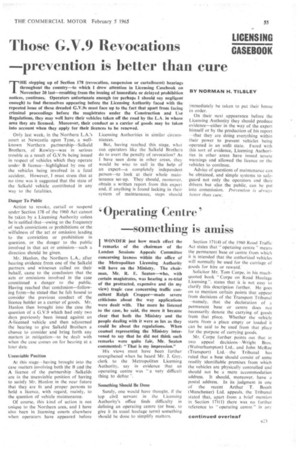Those G.V.9 Revocations CASEBOOK —prevention is better than cure
Page 57

If you've noticed an error in this article please click here to report it so we can fix it.
BY NORMAN H. TILSLEY
THE stepping up of Section 178 (revocation, suspension or curtailment) hearings throughout the country—to which I drew attention in Licensing Casebook on November 20 last—resulting from the issuing of immediate or delayed prohibition notices, continues. Operators unfortunate enough (or perhaps I should say negligent enough) to find themselves appearing before the Licensing Authority faced with the repeated issue of these dreaded G.V.9s must face up to the fact that apart from facing criminal proceedings before the magistrates under the Construction and Use Regulations, they may well have their vehicles taken off the road by the L.A. in whose area they are licensed. Moreover, their conduct as a carrier of goods may be taken into account when they apply for their licences to be renewed.
Only last week, in the Northern L.A.'s court at Newcastle upon Tyne, a wellknown Northern partnership—Salkeld Brothers, of Rowley—was in serious trouble as a result of G.V.9s being issued in respect of vehicles which they operate under B licence—highlighted by one of the vehicles being involved in a fatal accident. However, I must stress that at no time was it suggested that the state of the Salkeld vehicle contributed in any way to the fatalities.
Danger To Public
Action to revoke, curtail or suspend tinder Section 178 of the 1960 Act cannot be taken by a Licensing Authority unless he is satified that—owing to, the frequency of such convictions or prohibitions or the wilfulness of the act or omission,leading to the conviction or prohibition in question, or the danger to the public involved in that act or omission—such a direction should be given.
Mr. Hanlon, the Northern L.A., after hearing evidence from one of the Salkeld partners and witnesses called on their behalf, came to the conclusion that the acts or omissions involved in the case constituted a danger to the public. Having reached that conclusion—following form—he stated that he felt bound to consider the previous conduct of the licence holder as a carrier of goods. Mr. Hanlon then brought into the case the question of a G.V.9 which had only two days previously been issued against an A-licensed vehicle and then adjourned the hearing to give Salkeld Brothers a chance to consider and bring forth any matters in mitigation—to be dealt with when the case comes on for hearing at a later date.
Unenviable Position
At this stage----having brought into the case matters involving both the B and the A licence of the partnership---Salkelds are in the unenviable position of having to satisfy Mr. Hanlon in the near future that they are lit and proper persons to hold a licence, with regard, mainly, to the question of vehicle maintenance.
Of course, this kind of action is not unique to the Northern area, and I have also been in licensing courts elsewhere when operators have appeared before
Licensing Authorities in similar circumstances.
But, having reached this stage, what can operators like the Salkeld Brothers do to avert the penalty of revocation? As I have seen done in other areas, they would be wise to call in the help of an expert—a completely independent person—to look at their whole maintenance set-up. Thcy should, moreover, obtain a written report from this expert and, if anything is found lacking in their system of maintenance, steps should immediately be taken to put their house in order.
On their next appearance before the Licensing Authority they should produce evidence—either in the way of the expert himself or by the production of his report -that they are doing everything within their power to prevent vehicles being operated in an unfit state. Faced with this sort of evidence, Licensing Authorities in other areas have issued severe warnings and allowed the licence or the vehicles to continue.
Advice of questions of maintenance can be obtained, and simple systems to safeguard not only the operators and their drivers but also the public, can be put into commission. Prevention is always better than cure.


















































































































































































